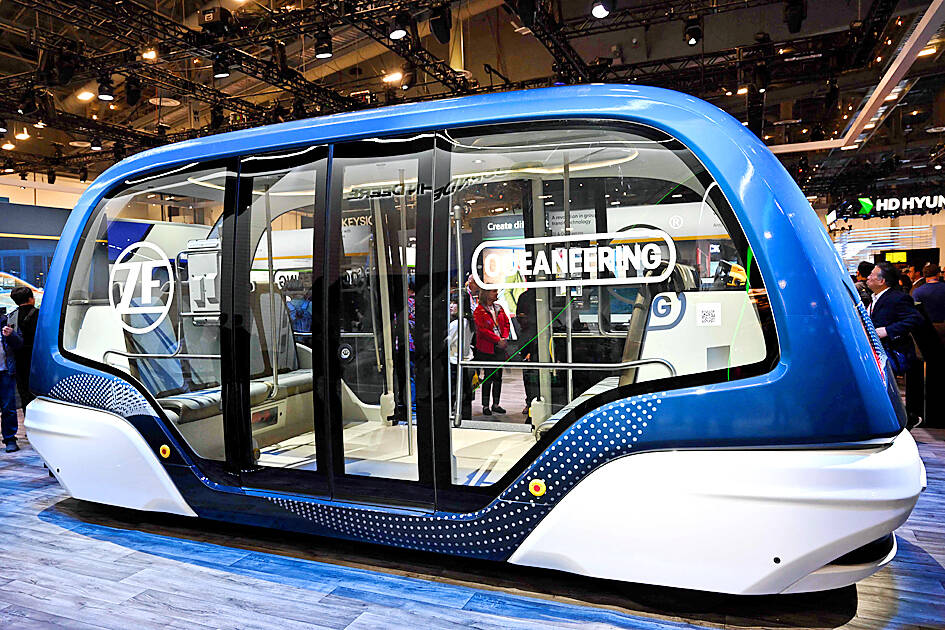Auto supplier ZF Friedrichshafen AG and Wolfspeed Inc plan to build a US$3 billion wafer factory in Germany’s Saarland to make chips for electric vehicles and other applications, a boon for a region dependent on combustion-engine components, according to people familiar with the matter
The go-ahead for the project is subject to commitments on subsidies amounting to a quarter of the total investment, the people said, declining to be named discussing private information.
ZF would hold a minority share in the factory with its US chipmaking partner, located in Ensdorf near Saarbrucken. ZF operates its largest factory nearby, where 9,000 employees make transmissions.

Photo: AFP
The plan would see the site of a former coal-fired power plant converted into the world’s largest factory for silicon carbide semiconductors, used in electric vehicles and photovoltaic converters. The move would create hundreds of jobs, the people said, providing relief over concerns for Saarland state’s 40,000 auto industry workers, where many toil to make combustion engine parts.
ZF and Wolfspeed hope to get a final decision on subsidies within the next couple of months, the people said.
The partners plan to start production of semiconductors in 2027 and reach full capacity by 2030. Spokespeople for ZF and Wolfspeed declined to comment on the plans. Handelsblatt earlier reported some details of the project.
The wafer fab in Saarland will help the EU in its ambitious goal of producing 20 percent of the world’s chips by 2030.
Germany’s progress luring international chipmakers has become tougher because of high energy prices and the pull of generous US subsidies under the Inflation Reduction Act. US chipmaker Intel Corp has recently delayed the construction start of its 17 billion (US$18.5 billion) semiconductor factory in Magdeburg. The company is in talks for more government subsidies to offset higher costs.
The type of chips Wolfspeed plans to make can boost the range of electric vehicles by as much as 15 percent with faster charging compared to conventional silicon chips. In addition to the factory, ZF and Wolfspeed plan to set up a R&D center in Germany, where ZF is to be the majority owner, the people said. The center would research applications of the chips in power inverters for electric ships or wind turbines.

Merida Industry Co (美利達) has seen signs of recovery in the US and European markets this year, as customers are gradually depleting their inventories, the bicycle maker told shareholders yesterday. Given robust growth in new orders at its Taiwanese factory, coupled with its subsidiaries’ improving performance, Merida said it remains confident about the bicycle market’s prospects and expects steady growth in its core business this year. CAUTION ON CHINA However, the company must handle the Chinese market with great caution, as sales of road bikes there have declined significantly, affecting its revenue and profitability, Merida said in a statement, adding that it would

i Gasoline and diesel prices at fuel stations are this week to rise NT$0.1 per liter, as tensions in the Middle East pushed crude oil prices higher last week, CPC Corp, Taiwan (台灣中油) and Formosa Petrochemical Corp (台塑石化) said yesterday. International crude oil prices last week rose for the third consecutive week due to an escalating conflict between Israel and Iran, as the market is concerned that the situation in the Middle East might affect crude oil supply, CPC and Formosa said in separate statements. Front-month Brent crude oil futures — the international oil benchmark — rose 3.75 percent to settle at US$77.01

RISING: Strong exports, and life insurance companies’ efforts to manage currency risks indicates the NT dollar would eventually pass the 29 level, an expert said The New Taiwan dollar yesterday rallied to its strongest in three years amid inflows to the nation’s stock market and broad-based weakness in the US dollar. Exporter sales of the US currency and a repatriation of funds from local asset managers also played a role, said two traders, who asked not to be identified as they were not authorized to speak publicly. State-owned banks were seen buying the greenback yesterday, but only at a moderate scale, the traders said. The local currency gained 0.77 percent, outperforming almost all of its Asian peers, to close at NT$29.165 per US dollar in Taipei trading yesterday. The

RECORD LOW: Global firms’ increased inventories, tariff disputes not yet impacting Taiwan and new graduates not yet entering the market contributed to the decrease Taiwan’s unemployment rate last month dropped to 3.3 percent, the lowest for the month in 25 years, as strong exports and resilient domestic demand boosted hiring across various sectors, the Directorate-General of Budget, Accounting and Statistics (DGBAS) said yesterday. After seasonal adjustments, the jobless rate eased to 3.34 percent, the best performance in 24 years, suggesting a stable labor market, although a mild increase is expected with the graduation season from this month through August, the statistics agency said. “Potential shocks from tariff disputes between the US and China have yet to affect Taiwan’s job market,” Census Department Deputy Director Tan Wen-ling